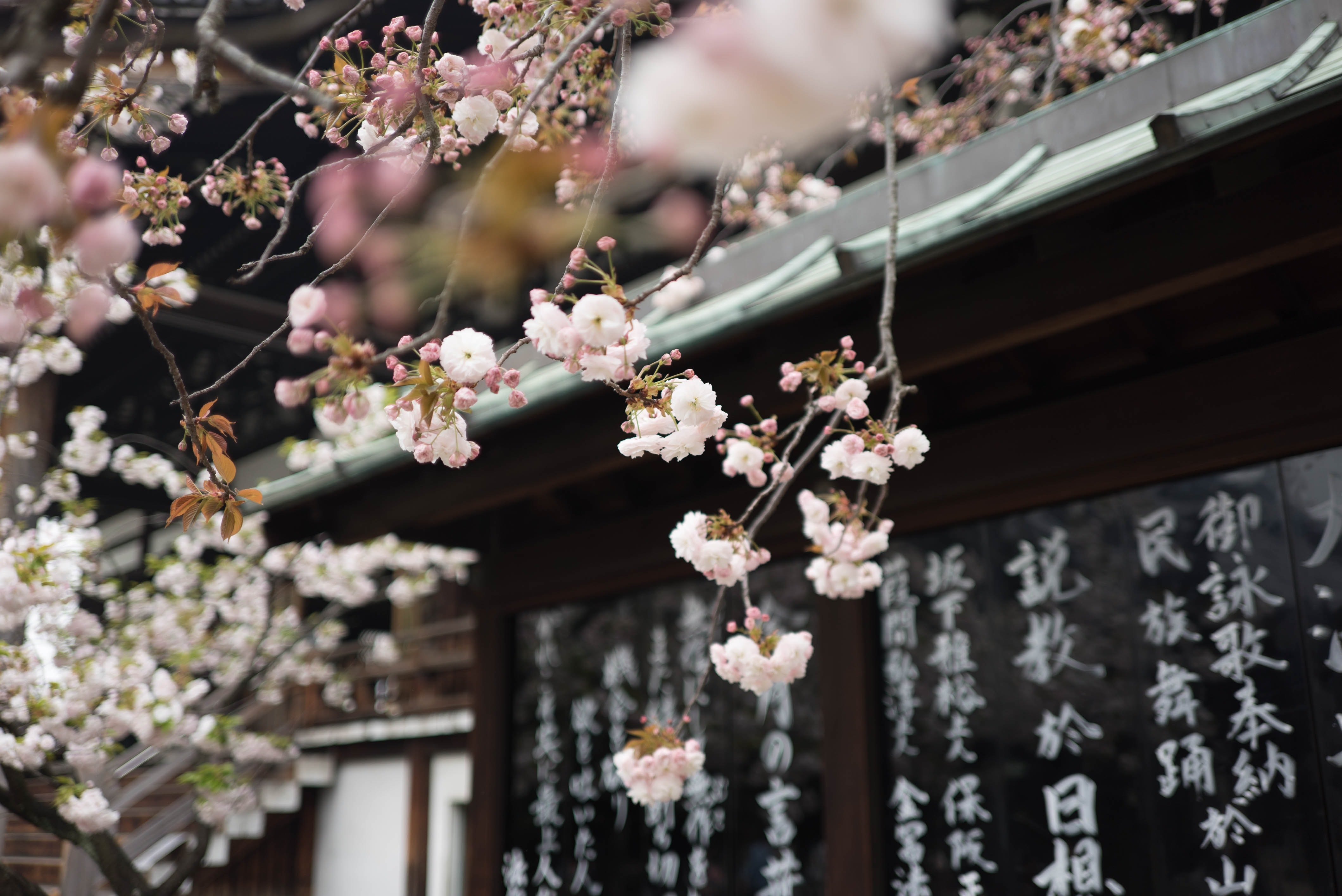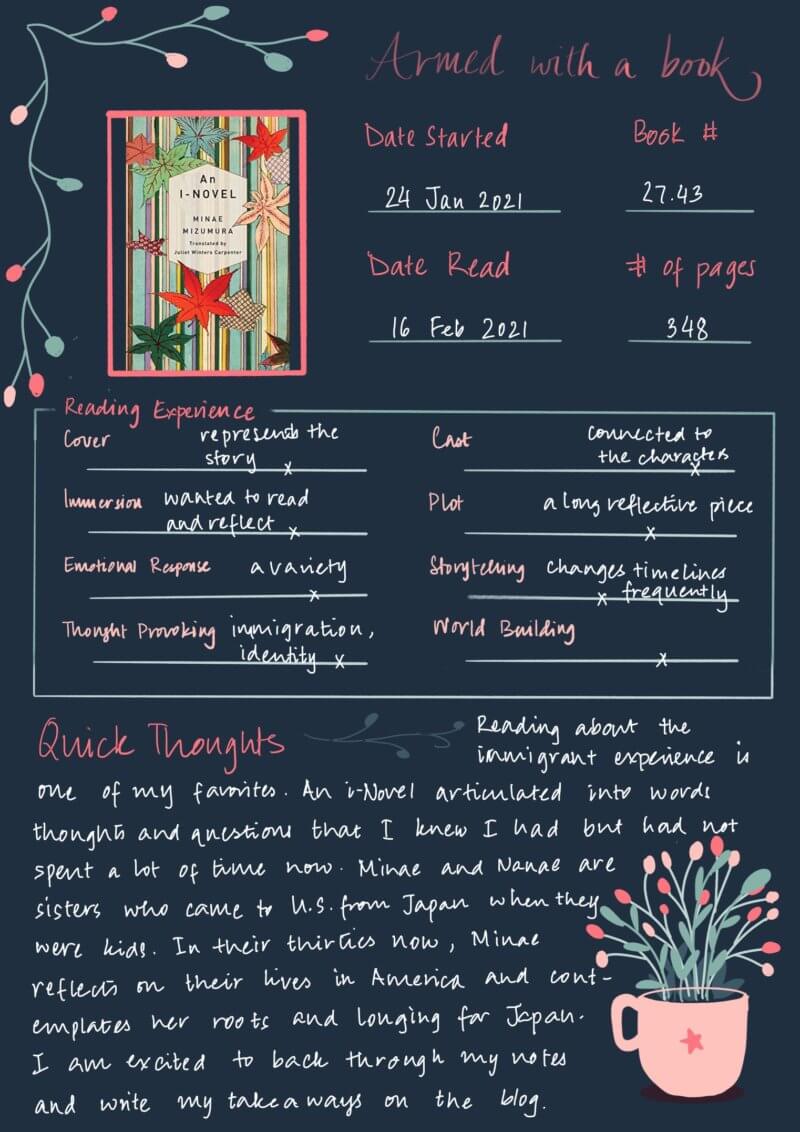Have you ever picked up a book, not realizing it was exactly the book you wanted to read? I did not know I was looking for a book like An I-Novel by Minae Mizumura (translated by Juliet Winters Carpenter) until I found this book and started reading it. I moved to Canada in 2014 and in all these years, I have noticed a lot of differences between my life in India and the West. Living next to the USA means I am also heavily influenced by the major happenings there, the discussions on race forming a prominent part of 2020. An I-Novel was a refreshing book because with the main character, Minae, I reflected on these important topics and ideas that only immigrants can truly understand. Take a look at the synopsis below and I will share my thoughts after.

Minae Mizumura’s An I-Novel is a semi-autobiographical work that takes place over the course of a single day in the 1980s. Minae is a Japanese expatriate graduate student who has lived in the United States for two decades but turned her back on the English language and American culture. After a phone call from her older sister reminds her that it is the twentieth anniversary of their family’s arrival in New York, she spends the day reflecting in solitude and over the phone with her sister about their life in the United States, trying to break the news that she has decided to go back to Japan and become a writer in her mother tongue.
Published in 1995, this formally daring novel radically broke with Japanese literary tradition. It liberally incorporated English words and phrases, and the entire text was printed horizontally, to be read from left to right, rather than vertically and from right to left. In a luminous meditation on how a person becomes a writer, Mizumura transforms the “I-novel,” a Japanese confessional genre that toys with fictionalization. An I-Novel tells the story of two sisters while taking up urgent questions of identity, race, and language. Above all, it considers what it means to write in the era of the hegemony of English–and what it means to be a writer of Japanese in particular. Juliet Winters Carpenter masterfully renders a novel that once appeared untranslatable into English.
Content Notes: Mental Health, loneliness, divorced parents.
Thoughts on An I-Novel
An I-Novel is a semi-biographical work, telling the story of two sisters Nanae and Minae who moved to the USA as kids. Now in their thirties, Minae longs for the Japanese homeland and reflects on her experiences as an immigrant. Minae articulated thoughts about immigration, identity, race, language and more that I had on my mind but had not had time to reflect upon. An I-Novel is partly the tale of two sisters becoming westernized, sometimes by choice and sometimes unknowingly. Though I moved to Canada in my early 20s, I related to a lot of the experience that Minae shared. In spite of that, there were still differences in our experiences and I want to highlight them both in my post today.
On Language
An I-Novel is a love letter to the Japanese language. Minae read Japanese novels as a youngster and ignored English most of the time. She went out of her way to avoid it and instead chose to study French later in life. Throughout the book, Minae is pondering her next steps in life – once she finishes her French orals, she is going to move to Japan and be a novelist. She wants to write in Japanese but she never quite learned it once she moved to the USA. Minae’s love for her mother tongue is endearing to me. I wish I had that for my mother tongue.

On Identity
Some aspects of our identity only become relevant in other settings. Minae articulates the fact beautifully that being a Japanese in Japan is nothing special, but a Japanese in America has a whole other meaning. What was so normal and everyday for us is exotic in another place. I think this experience is something that only immigrants truly understand, having lived with multiple identities. I am not officially a Canadian but I love Canada and I am a Canadian in my mind.
Minae also expresses her disbelief at being clubbed under ‘Asian’ along with the Chinese, Taiwanese, Koreans, etc. As a kid, her young mind does not understand how someone does not know the difference between the different peoples. There is also history that these groupings do not always recognize. Japan colonized Korea and certain parts of Asia. How does it feel to be grouped with the colonized or the colonizers? I am many generations removed from when the Britishers colonized India but it would be odd to be in the same group as them.
I am grouped under ‘South Asian’ which includes countries like Pakistan, Bangladesh, and Sri Lanka. An I-Novel made me reflect on the fact that Western society uses these groups to identify people while we personally do not have any personal connection to these groups. Minae is Japanese. I am Indian. I am not a South Asian. Going even broader, I may be born in one small part of Asia, but that does not make me Asian. I don’t represent Asia. Asia is so diverse – I know very little of it.
Saying that someone belongs to a group for our convenience, does not mean that the person truly associates with that group too. These realizations come with experience and reflecting upon that experience.
Along these lines, Minae’s bafflement with calling people ‘colored’ was refreshing to read. That confused me too but when you live in a society where such things are the norm, what all can you truly question? Minae talks about losing her innocence the more time she spent in the USA – seeing race and color – two concepts that just weren’t part of her world in Japan. I share the same experience with her. Of course, India had its own set of issues, but they were not color and race when I was there. And by moving to another country, I might have broadened my horizons, but I also learned some truths about the world that were unexpected. I have been trying to learn more about the history of this place that I call home now and understand my own place in it.
On Returning Home
Maybe it was never worded that way, but for the longest time (especially before I met Clinton), there was a hope, and maybe an expectation, that I would come back home. It was just known that I was travelling back to India every year. Minae did not have any such expectation because she moved to the USA as a child but her reflections on what typical Japanese families did, and my experience with Chinese friends who have returned home, spoke volumes to me. I wondered what it is that makes the Japanese and Chinese (and maybe people from other countries) go back home but I don’t have the same feeling. What do the Japanese and Chinese have that roots them so securely to their country and culture that they want to go back? Why don’t I want to go back to India?
The answer is actually quite simple. While Minae and Nanae were expected to make good Japanese matches (and we are talking in the late 80s here so this may not be true anymore), there was no such expectation for me. I built my own home here and yet, India will always be home for me, and a part of me will always mourn losing that official document when I become a Canadian (at least 5 years to go but I feel sad every time I think about it). The concept of home through this book has been so much on my mind that, lately, I have been noticing my dreams. There are three places I dream about primarily – my paternal ancestral home where I spent the first two years of my life and all my summers as a teenager, my home and locality in India where I lived from Grade 1-9 and the little apartment that I share with Fiona and Clinton now.
I think age plays a huge role in how we feel about our home countries as well, though that does not mean the experience is consistent. Minae and Nanae moved to the USA when they were little. Their idea of Japan is not necessarily the Japan that exists in real life. If you have traveled, you know that living in a country is very different from visiting it for short periods of time. I came to Canada in my early 20s. I had a pretty good idea of what India was going to be like and I am happy with where I am.
On the Format of An I-Novel
This is a bilingual book, written in Japanese and English. To preserve the interplay between the two languages, English phrases and words are printed in a different typography than the translated Japanese text. This was a unique book in for this reason too and I loved the notes by the translator describing the work that went into preserving the bilingualism of the book while translating it completely into one language.
An I-Novel is an amazing book. It provides a lot of historical context about Japan that I did not know. It also shares real life experience that I did not realize I so badly wanted to read. Gift this book to a friend who has moved countries. It is the conversation they need to have with someone who has done the same. Or just connect them with me. 🙂

** An I-Novel will be released on March 2rd, 2021. Be sure to bring this book to the attention of your local library so that other people can find this book too. **
Amazon Kindle
Thank you so much for reading this review. It is close to my heart. Another review along similar lines is Sejal Shah’s This is One Way to Dance.
Many thanks to the publisher, Columbia University Press, for providing me a complimentary copy of the book with a request for an honest review.
Cover image: Photo by Galen Crout on Unsplash

This sounds really good, Kriti! I’m adding it to my list! Thank you! xoxo
Can’t wait to hear what you think of it, Camilla! xoxo